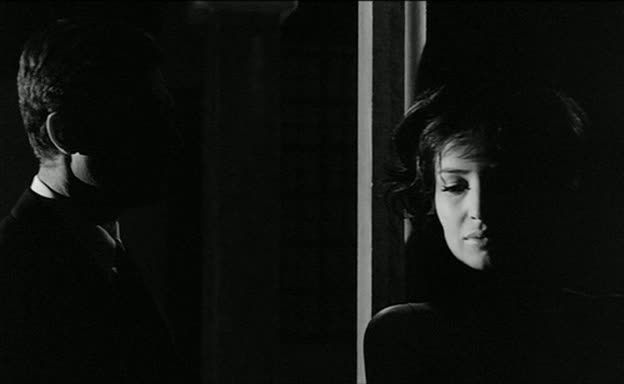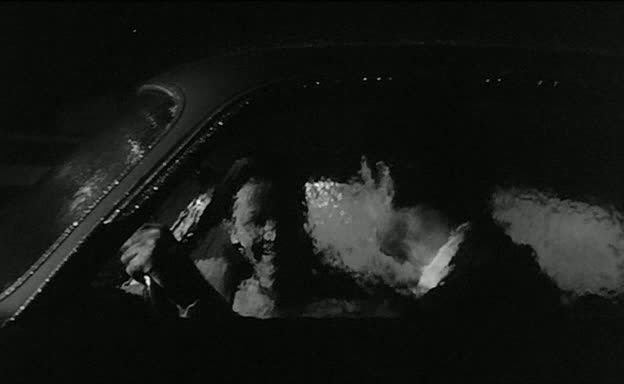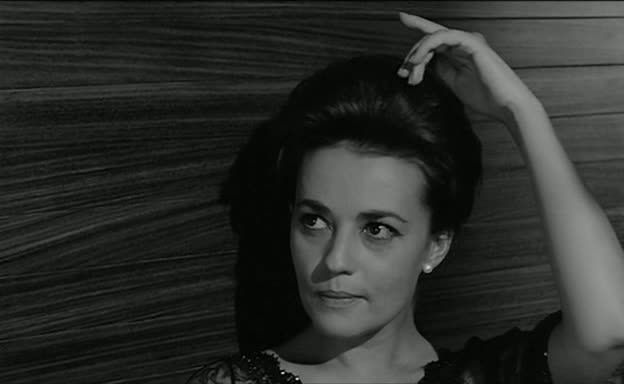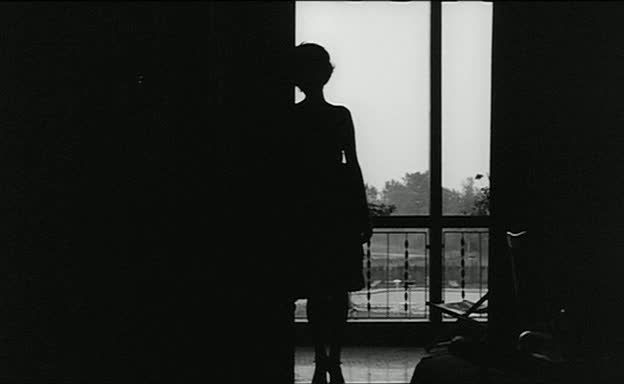

La Notte is perhaps Michelangelo Antonioni's most complete portrait of the deadened emotions that constitute his essential subject, the boredom and disconnection and lack of communication in a drastically changing modern world. In the first twenty minutes of the film, the married couple of Lidia (Jeanne Moreau) and Giovanni (Marcello Mastroianni), a novelist, don't say a word to one another as they go to visit their dying friend Tommaso (Bernhard Wicki). They turn to one another occasionally, seemingly about to speak, their lips starting to move, a rueful smile reflecting their uncertainty with one another, but they never say anything. With Tommaso, they each speak to him independently but still say nothing to one another, as though they're each dealing with their individual grief and sadness over their friend's illness. They're together and yet locked off from one another, and when Giovanni is assaulted by a young "wild woman" in an adjoining room, a sexy lunatic in a black slip who fixes him with a dark, unrestrained stare and throws herself onto him, he allows her to lead him into her room, kissing her and letting her pull him down onto her bed until the nurses discover them and restrain the girl. This moment of unhinged passion, crazy and illicit, reflects what's missing from the married couple's life, and the same point is made when Lidia and Giovanni go to a club together where a black woman, assisted by a muscular and shirtless black man, performs a striptease with contortionist maneuvers, hypnotizing Giovanni, who ignores his wife to watch this display of physicality and open eroticism.
La Notte follows this couple through the remainder of this troubled night and into the next morning. It's about their distance from one another, their distance from their own past. After their visit with Tommaso, they spend much of the film apart from each other, occasionally coming together only to split apart again, to go off on their own, each suffering and thinking in solitude. Lidia wanders the city, exploring the neighborhood where the couple had lived together earlier in their relationship, as though nostalgia could help her to recover some of that earlier happiness, or at least to understand what had gone wrong. Later, they go to a party together, where they each flirt with other people, losing one another on the sprawling grounds of the mansion where the party takes place.
The film both captures and embodies their alienation and their ennui, their feelings of aimlessness and abstracted loss. La Notte is often boring, as Giovanni and Lidia wander around the party, exchanging banalities with the other guests, meaningless chit-chat that only augments the sense of pointlessness pervading everything. That's why Antonioni has made the ultimate portrait of modern boredom, risking boredom in the process: he incorporates boredom into his film. He allows his audience to be bored right along with Giovanni as the host, the rich real estate developer Gherardini (Gitt Magrini), tries to position himself as a kind of artist, tries to pretend that he's like Giovanni, that he doesn't care about money. But the man is a bore, a self-important fraud who just likes to hear himself talk — and who tries to hire Giovanni to apply his literary talents to writing press releases and advertising copy for his business, a fairly naked example of commerce attempting to seduce and co-opt art, and art wavering on the verge of acceptance, out of indifference and insecurity.

Giovanni's disaffection as a writer mirrors the disaffection in his life: just as he feels that he no longer knows how to communicate in writing, he fails to communicate with his wife, and a gulf opens up between them, represented in the film by their isolation from one another, by the sense that for much of the film they're each engaged in their own individual stories rather than coming together for a single story as a married couple. During the early sequences of the film, Lidia wanders the city alone, pausing to watch some boys shoot off rockets in a park and to break up a violent fight between some other young men, but mostly just silently walking through a modern urban landscape. The film has a strong vertical feeling in these scenes, an upward tension in the compositions, which seem to be constantly drawing attention toward the top of the frame. Lidia is often positioned in the lower portion of the frame, with large blank walls filling the space above her. The sounds of airplanes and helicopters passing by overhead call her attention — and the audience's — towards the sky, as do the skyscrapers looming around her, stretching up towards the top of the frame seemingly without end. When she watches the boys shooting off rockets, the camera tilts up to watch one of the rockets spiraling up until it disappears, leaving behind a gray corkscrew barely differentiated from the pale, featureless gray of the sky itself.
Later, at the party, Giovanni grows enamored of the younger Valentina (Monica Vitti), while Lidia is slowly pursued by Roberto (Giorgio Negro). The boredom and isolation of the party is then broken up by scenes of sensuousness and charming flirtation, scenes that hint at a break in the endless disconnection and lack of communication plaguing all of these characters. A rainstorm is greeted, not as an end to the festivities but as an excuse for the embrace of excess and carnality, as the guests jump in the pool, writhe about in the rain, run around laughing and screaming as they're soaked. Roberto takes Lidia for a ride in his car, and Antonioni's camera follows alongside the car in a lengthy tracking shot, the rain streaming down the windows and distorting their faces into impressionistic blurs, which are alternately illuminated by streetlights or swathed in darkness so that they create silhouettes in the dark. They're talking and laughing in the car, but there's no sound of their dialogue on the soundtrack, so this moment of connection and warmth, so unlike the quiet, standoffish scenes between Lidia and Giovanni, is presented from a formal distance, allowing the pair their private intimacy.

Once the titular night falls, indeed, shadows and silhouettes predominate in the film's visual vocabulary, as in the sequence where Valentina, half veiled in shadows, tells Giovanni that she doesn't want to break up his marriage, the shadows suggesting that she's only telling half the truth. Later, when Giovanni and Lidia leave the party, Valentina bids them both goodbye together, as a couple, and then stays behind, a silhouette against the window, her curved body blending into the darkness left in her room as the early morning light seeps in from outside. These poetically beautiful images add to the sensation of picturesque ennui: these deeply sensual images capture the characters' isolation and loneliness, their disconnection from each other. When Giovanni first sees Valentina, it's through reflections, a false image of the woman hovering like a ghost within a large glass pane. Giovanni's own reflection is superimposed into the window so that it almost looks like he's walking directly towards the woman, and then the camera pans right and the reflections shift, and the geography is completely reconfigured as Giovanni steps in from another angle. Such misleading images, in which perceptions shift and reflections create doubled or tripled doppelgangers, suggest that even at such junction points of potential connection, there are multiple layers separating and confusing these people, like the glass that divides them and projects them outside of themselves.
As Valentina says, in a moment of confession that could apply just as well to either Giovanni or Lidia, "whenever I try to communicate, love disappears." That's the central dilemma here, this inability to maintain connections through communication. These people, dwarfed by the clean, unadorned surfaces of urban living, shrouded in shadows, fenced in by concrete and split in two by glass, look to the past — the railway that ran through the neighborhood where Giovanni and Lidia once lived, the tracks now overgrown with weeds and decaying from disuse — but find no comfort or stability there, either. When, at the end of the film, Lidia reads Giovanni a very moving love letter he once wrote her, he doesn't even recognize the words as his own, asking her who wrote it. He can't communicate that passionately or that clearly anymore. In the final shot, the couple embraces, going through the motions, half struggling against one another and half trying to recapture that depth of feeling, as the camera pulls back and pans discretely away, leaving them increasingly small and isolated, together, lying in the sand trap of a golf course.









0Awesome Comments!